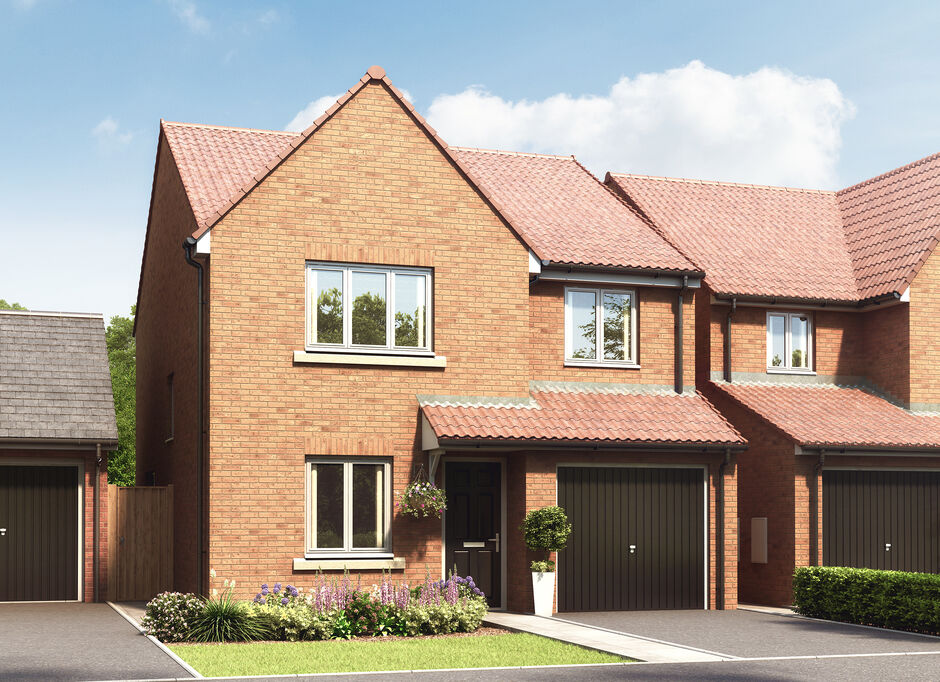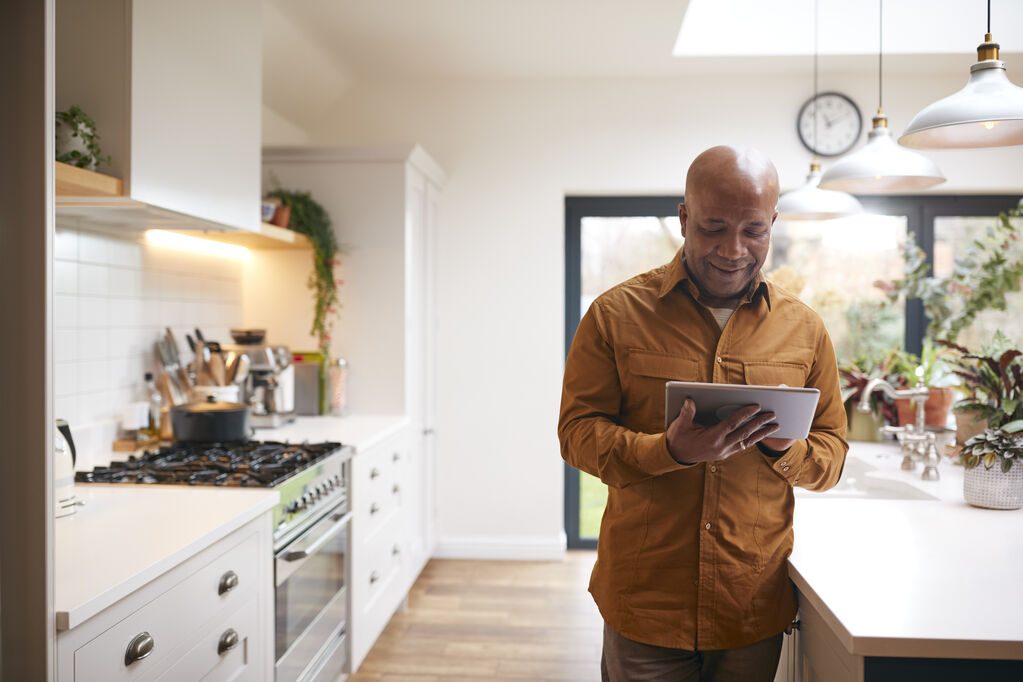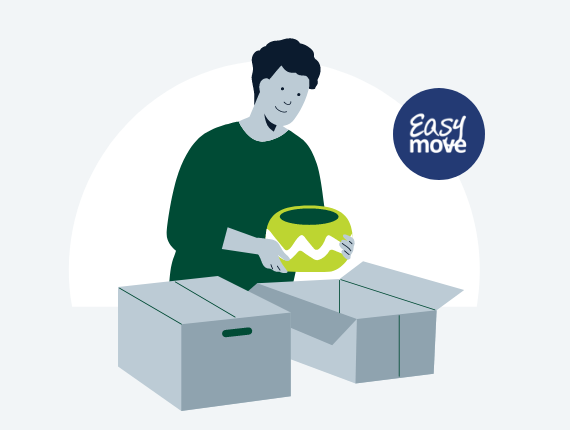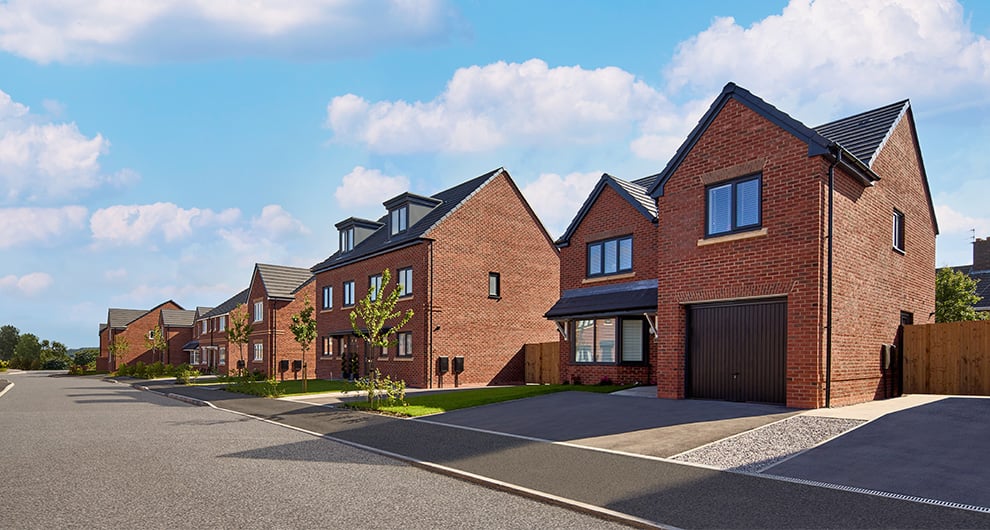Buying guide
Understanding costs and choosing your new home
The Cost of Buying a House
Buying a new home is one of the biggest investments you’ll make. As well as the initial deposit, there are a number of other costs involved in buying a house that you can expect to encounter on your home buying journey.
As with any big purchase, preparation and budgeting is key. To do that, you need a transparent view of the costs when buying a house. From the obvious big spends to some you may not have considered, here is a quick guide to the main costs involved to help you work out your home buying budget.
Upfront house buying costs
The upfront costs of buying a house make up your main spending during the move. These are costs that must be paid to ensure to process runs smoothly, so you need to be sure you have enough saved and put aside to cover them. Your upfront costs include:
Deposit
The first and perhaps more obvious cost of buying a home is your deposit. When buying a home, you don’t usually pay the full home cost upfront – instead, you pay a deposit to secure the property, and then a monthly mortgage to pay off the remaining costs. Traditionally, most mortgage lenders asked for at least a 10% deposit.
Stamp Duty / Land and Buildings Transaction Tax (Scotland)
Stamp duty is a Government tax when buying a home, applicable to houses that cost £250,001 or more. Stamp duty can, however, vary depending on personal circumstances and whether you’ve bought a home before – first-time buyers can expect no stamp duty on the first £495,000 spent on a property. And, in Scotland there is zero Land and Buildings Transaction Tax on any home that costs up to £175,000.

Valuation fee
All mortgage lenders will want to value your new home for themselves before they lend you the money – even on our homes which offer fantastic value for money. Each lender is different and some offer a free valuation service, whereas others will charge – on average you should expect to pay from £150-£200.
Solicitor’s fees & electronic transfer fee
When moving to a new house you need a solicitor to carry out the legal work of buying (and possibly selling) your home – this is called conveyancing. Your solicitor will handle all contracts, provide legal advice and carry out local council searches, work with the Land Registry and transfer the funds to pay for your property. Costs can vary depending on whether you’re buying and selling or just buying, but budget for between £500-£1,500 and don’t forget to add on 20% for VAT. Many mortgage providers charge a fee for transferring your mortgage money from themselves to the solicitor. Be sure to check but the usual cost is between £40 and £50.
Surveyor’s fee
Particularly if the home you’re buying is not a new build, it is important you get the property checked over by a surveyor before you make your purchase. An independent surveyor can highlight any problems with the property that may need to be fixed before you buy or things that may bring about additional costs once you’ve moved in. There are different levels of survey you can opt for – cheaper options cost from £200 and cover the basic condition of your home, while full structural surveys can be anything from £600+. While it could be tempting to pay less upfront, having a thorough survey carried out before you move can save you money on repairs in the long term.
Home insurance
It’s important not to forget to budget for home insurance. Having adequate cover is one of the conditions your mortgage lender will set out before lending you the money, but this doesn’t mean you have to buy insurance from them. Shop around and don’t forget you may be able to get a better deal when you combine your building and content insurance into one policy.
Moving day costs
Once you’ve paid all your upfront costs and almost completed the home buying process, it’s time to prepare for moving day. Moving day itself is a day that turns up additional costs. Make sure you’ve budgeted for:
Packing & removal costs
From boxes to bubble wrap, the costs of packing up your belongings can quickly add up. You can save money during this process by putting aside boxes in the build-up to the move or asking around in case anyone you know has any spare.
How much or how little you spend on removals is up to you. A professional removal service definitely makes moving in day run smoother but can cost anything from £300 to £2,000, so it’s worth shopping around and comparing what you get for your money. Hiring a van and doing it yourself is the cheaper option if you don’t mind a bit of hard work. Remember to recruit family and friends to help if you can and check our moving day guide for more tips.
Cleaning costs
If you’re leaving a rented property, it is likely written into your contract that it must be cleaned. If rental properties are not left properly cleaned, it is possible you will face additional charges from your landlord or letting agent or may lose this cost from your deposit. For this reason, many choose to shop around and pay for a professional cleaner themselves. If you’re leaving a rented property, ensure you’re prepared for any additional costs such as this.

Ongoing costs
So, you’ve done the hard part. Congratulations on buying your new home!
Your initial house buying costs should all be covered at this point, however, the ongoing costs of owning and maintaining a home still apply. Once you’ve bought your home, here are some of the monthly costs you can expect to budget for.
Home maintenance and repairs
If you’re moving into a new build home, you won’t have repairs to worry about. However, furniture and decorating costs can also add up quickly, so consider what you need and want to buy once you’ve moved in, and ensure you’ve put enough money aside.
Running costs
As with any property, once you’ve bought your new home you will be responsible for utilities and tax. Council tax costs differ based on where your property is located and which council tax valuation band it falls in – it is worth checking this information when you are house hunting.
Mortgage costs
You’ve paid a deposit towards your home which enables the buying process; the remaining cost of the home will need to be paid each month via your mortgage. The cost of your mortgage will be arranged earlier in the home buying process when you speak to your mortgage advisor. The price of your mortgage repayment will, of course, depend on the value of your home, as well as how much deposit you’ve already paid.
Estate Management Fees
The majority of our new developments will be looked after by a Management Company, these companies charge an annual fee that is required to contribute towards the upkeep of communal areas and green spaces as the Council does not carry out this work.
Leaseholder’s costs
If you’re buying a property, you will either be buying on a freehold or leasehold basis. If your home is leasehold, this means you are required to pay ground rent and service charges on the property – this is paid to whoever owns the freehold. Ground rent is usually £50-£100 a year, while services charges can be up to £1,000+ a year. This price changes from property to property so may be much more, or much less. Make sure you’re aware of these additional charges when you’re deciding whether a property is right for you.

How is Council Tax Calculated on New Builds?
There are lots of costs to consider when buying a house and moving. As well as the solicitors and home costs, you also need to think about setting up your everyday bills. One of the bills that will need setting up on your home is council tax. From bands and costs to how council tax is calculated on new builds, here’s everything you need to know.
What is Council Tax?
Council tax is a local tax that is collected by the authority/council in your area. With some exceptions, council tax applies to all domestic properties, so if you’re moving into a new build, you will need to pay council tax on your property.
How are Council Tax Bands Decided?
For residential properties, council tax valuations are based on the overall value of the home and properties within the area. Council tax is banded, so your home will be given a band based on the value of homes nearby – so, higher-value areas tend to have higher council tax bands.
Council tax bands in England are based on the price the property would have brought on the 1st April 1991 in England, and the 1st April 2003 in Wales. If the home is newer than these dates, the banding is worked out based on what the property would have been worth at the time.
You can check your banding for council tax for England and Wales here on the Gov website, and banding for Scotland here.
How is Council Tax Calculated on New Builds?
All properties are assessed to make sure council tax bands are accurate. These assessments happen whenever something changes on the property, such as the property size, use, or location, which means new build homes are automatically assessed.
Council tax for new build homes is calculated with the same considerations as any other home.
Property assessments for Council Tax bands are made based on the property:
- Size
- Layout
- Character
- Location
- Change in use (for example, converted properties)
- Value (based on 1991 in England and 2003 in Wales. For new properties, value is calculated by comparisons to similar properties in the area).
When a new build home is built, or if an existing property is converted for domestic use, your local council will provide the VOA (Valuation Office Agency) with the information they need to allocate the new property with a council tax band.
To do this for a new build, the VOA will either use the information they have to hand to determine the property band or, in some cases, they may visit the home or development to gather more information. This is usually a short visit that includes an outside inspection and a couple of pictures taken for reference.
If you move into a new build property that hasn’t yet been given a council tax band, we’d recommend getting in touch with your local council who can contact the VOA and help get things moving. You can also be issued with an estimated Provisional Banding while you wait, which can help you avoid a larger bill when your council tax band is determined.
How Much is Council Tax?
While council tax bands are consistent across the country, the exact amount you need to pay per band can vary slightly from area to area, depending on your local authority and council. Once you know your property band, we’d recommend checking your local council’s website to find out the exact council tax cost for your new build home.
We understand buying a new home and moving can be a stressful time. To help you get prepared for the big day, we’ve put together a list of our top Moving Day Tips.


Costs if you’re also selling your home
If you’re selling your current home as well as buying, there are additional fees you can expect to pay.
You will be responsible for your share of the legal fees, but also need to consider:
Estate agent fees
If you’ve got a home to sell, there’ll be estate agent fees to pay – these usually range from 1-3% of the sale price plus 20% for VAT.
We can help make selling your home quick and save you a fortune too with our Easymove scheme.
We’ll take care of everything from arranging valuations and negotiating the sale to recommending solicitors and mortgage advisers. And when your house is sold, we’ll pay the estate agent fees in full. So that’s one less cost to think about.
Choosing your new home
You’re not just buying a new house. You’re buying into a new way of life. A new community, new surroundings and of course a new home that’s everything you need it to be.
Buy into the neighbourhood first
At Keepmoat we know there’s more to creating great places to live than building great homes. It’s why we invest in the neighbourhood too. Creating developments with interesting and varied street layouts and with as much open public space as possible.
So when you’re having a look around, don’t spend all your time in the showhome. If it’s possible, have a look around the development and get a feel for the place. Find out what’s nearby, shops, schools, parks etc.
Find your dream home
It’s a good idea before you fall in love with a home to work out what you can afford. Also think about what you need. How many bedrooms? Would a three story townhouse suit you or would a semi or a detached home be better? And remember to try and find a home you can grow into. That way you can be sure it will be the right home for years to come.
Visiting one of our fabulous showhomes is a great way to get a feel for what a Keepmoat home is all about. It’s great for a bit of interior design inspiration too.
Don’t just choose the right home. Choose the right builder too.
When you buy from Keepmoat you can relax safe in the knowledge that we’re as meticulous about the details are you are. We’ve built over 30,000 homes and have a strong reputation for creating homes and communities that are innovative and well designed. We also know that there’s more to a great home buying experience than bricks and mortar. It’s why we make sure the whole process is simple and as transparent as possible. And you can rely on us to be on hand, ready with helpful advice, whenever you need us.

